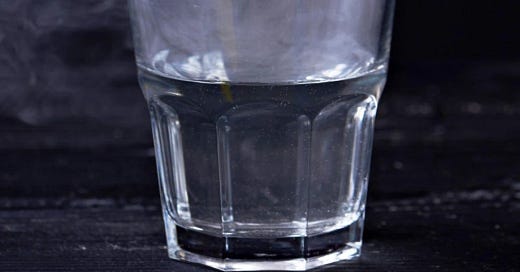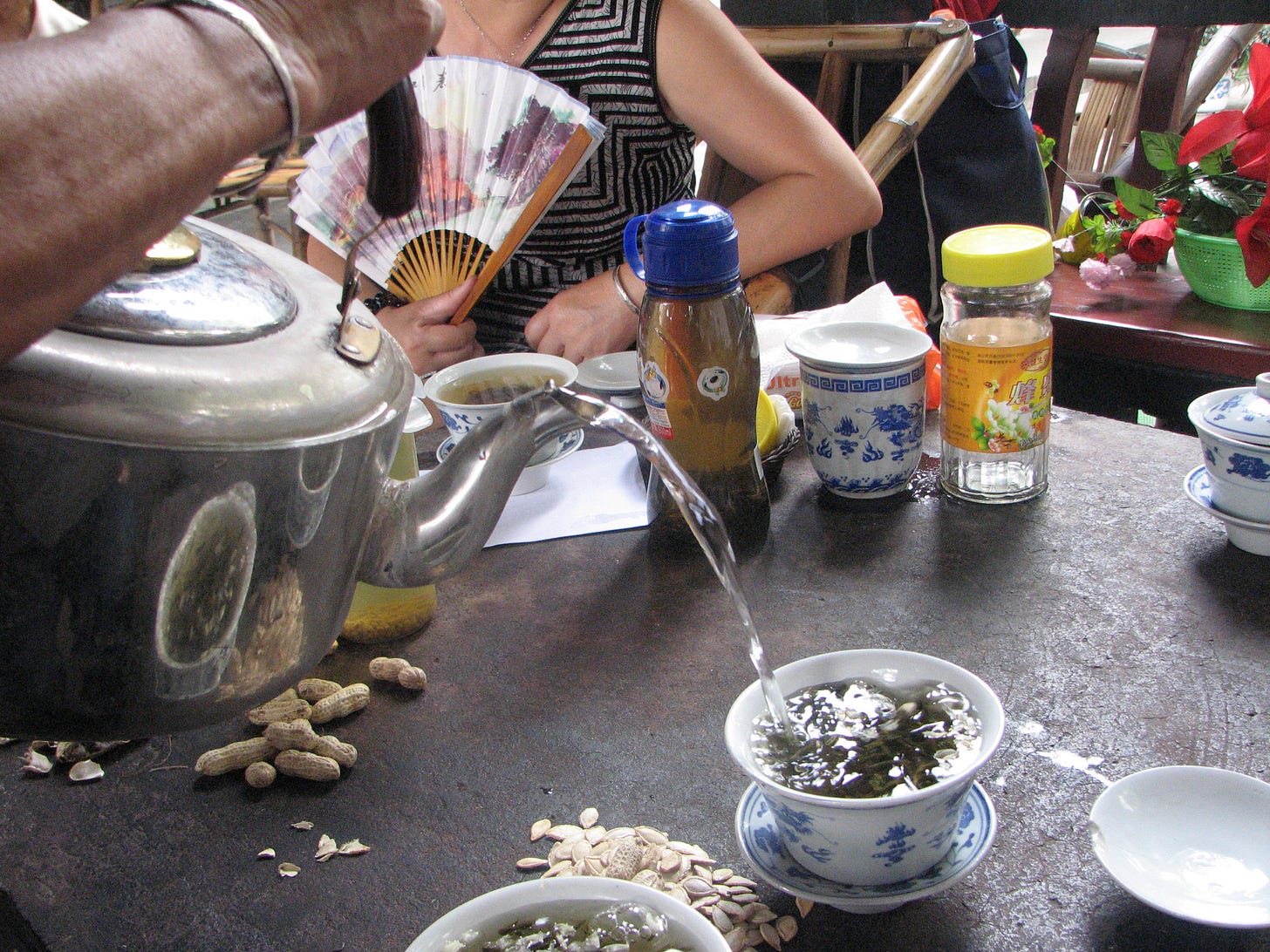Hola Jigsawers,
Hope everyone is well. It’s getting warm here in Spain, and we’re all looking forward to the summer holidays. I’ve been studying Spanish, as you know, and occasionally getting into hot water because of it.
My latest Spanish faux pas: I was introduced at a party to the man who represents La Liga in India. Eager to flex my linguistic skills, I complimented him on his snazzy socks- which featured cute panda bears. Only problem, I told him that I loved his "calzoncillos" (underwear) when I should have said "calcetines" (socks). He corrected me very gently.
This week’s post plunges into the depths of China’s beverage of choice: hot water. I remember being told, when I lived in Beijing, that the best way to cool down in the summer was to drink hot water. Read into that what you may about the Chinese pysche, but first don’t forget to spread the word about the Global Jigsaw.
And do consider subscribing. It’s almost as cheap as a cup of hot water with some tea leaves. I’ll also send you a framed certificate stating you are a Patron of Pallavi. (or maybe not).
**************
Every nation has its tipple. India has masala chai, Belgians enjoy good coffee, Spaniards must never be parted from their vino, and an ice-filled coke remains the American beverage of choice.
In China it is water. Or to be precise, hot water. This preference distinguishes them not only from the Western world, but even their neighbours.
Snow is to Eskimos what hot water is to the Chinese
As someone who has lived in both Japan and China, I am often asked about the differences between the two peoples. There are many. The Chinese express, the Japanese suppress. The Chinese are aggressive, the Japanese are passive aggressive. But what stands out most immediately is that while the Japanese drink iced water, in China the water is hot.
On a visit to Beijing a couple of years ago from Tokyo, I’d fetched up at a restaurant sweaty from sightseeing and desperate for an ice-cold thirst quencher. But requests for water descended into a minefield of temperature and terminology, the inevitable outcome of which was a glass of hot water of some type.
There was "kai shui" or boiling water, "re shui" or hot water and "wen shui" which is literally water at room temperature, but in practice water that is cooler than "re shui" but warmer than what would normally pass as lukewarm.
In fact, most Chinese rarely drink "bai shui" or plain water, preferring to sip "cha shui" or "tea water" through the day.
The hot water vaccine
This tradition, strange and frustrating to peoples from other countries who are habituated cold water drinkers, has in fact saved more lives than the most cutting-edge vaccines.
Access to clean drinking water or water that is uncontaminated by sewage remains one of the most pressing, if unglamorous, health challenges facing the world today. Diarrhea caused by unclean drinking water kills more children across the world than HIV. According to UNICEF, over 1,300 children under five die of diarrhea every day.
Of these diarrhea deaths, India accounts for the largest number in the world. In 2015, about 321 Indian children died every single day because of diarrhea That’s over 117,000 deaths a year.
By contrast, in China, which is the only other country with a comparable population, diarrhea deaths in children under five number less than 10,000 annually.
Climatic differences and improved access to sanitation in China play an important role in explaining this divergence. But China’s hot water habit is germane too. The health benefits of this practice have long antecedents stretching back to the traditional Chinese medicine concept that the stomach’s energy is upset by overly cooling foods and drink.
Effeminate tea-drinking Chinese
In his book The Chinese who built America: the Chinese railroad men, Stan Steiner points out how the 13,000-odd Chinese emigrants who worked as construction labourers building the great American railroad network in the 19th century were constantly belittled by their white co-workers. The Chinese were mockingly referred to as "effeminate" and their habit of brewing barrels of tea that were served all day long in tiny cups such as "ladies see fit to use" was laughed at.
However, it was this very habit that saved the Chinese workers from the dysentery, cholera, and death that plagued their colleagues from elsewhere. For boiling water before drinking it, is as powerful a preventative medicine.
Patriotic hot water drinking
Decades later, the Chinese Communist Party became the chief proselytizer of the consumption of hot water. Communist soldiers fighting Nationalists during the civil war of the 1930s and 40s who were not provided with freshly boiled water could take the matter up with their superiors, while those found drinking unboiled water were verbally chastised.
When the communists came to power in 1949, the government established free hot water services in schools, factories, and government departments across the country, a practice that has persisted through all the tumultuous changes that the ensuing decades brought with them.
A few years later, in 1952, the government launched a Patriotic Health Campaign, plastering school walls with slogans exhorting children to “cultivate the habit of drinking boiled water three times a day.”
My visit to Beijing from Tokyo was in 2017. Almost a decade had passed since I’d resided in the city. As I walked around, I’d marveled at the many transformations in the city skyline. A mobile payments revolution had made cash almost defunct. The Internet was more heavily restricted: many of the sites that used to be accessible (I joined Facebook while resident in China) were blocked. Taxis, once only rivaled by foot massage parlours in their ubiquity, had become difficult to flag down. The cost of living had grown exponentially.
But the universal availability of hot water provided some semblance of continuity. I found myself glancing at the kettle in my hotel room with nostalgic approval.
Chinese girlfriends
Chinese girlfriends, however, do not always share the same sentiment. A joke that references the penchant of boyfriends to advise “he re shui” or “drink hot water” as a panacea for every ailment has been doing the rounds on Chinese social media:
Girl: Honey, I have a cold.
Boy: Drink some hot water.
Girl: I have a period cramp.
Boy: Drink some hot water.
Girl: I have a stomachache.
Hasta la proxima
xxxx
P
PS: What’s your favourite drink? Let me know in the comments below.






Sol curry with coastal sea food ! Konkan coast to be precise !